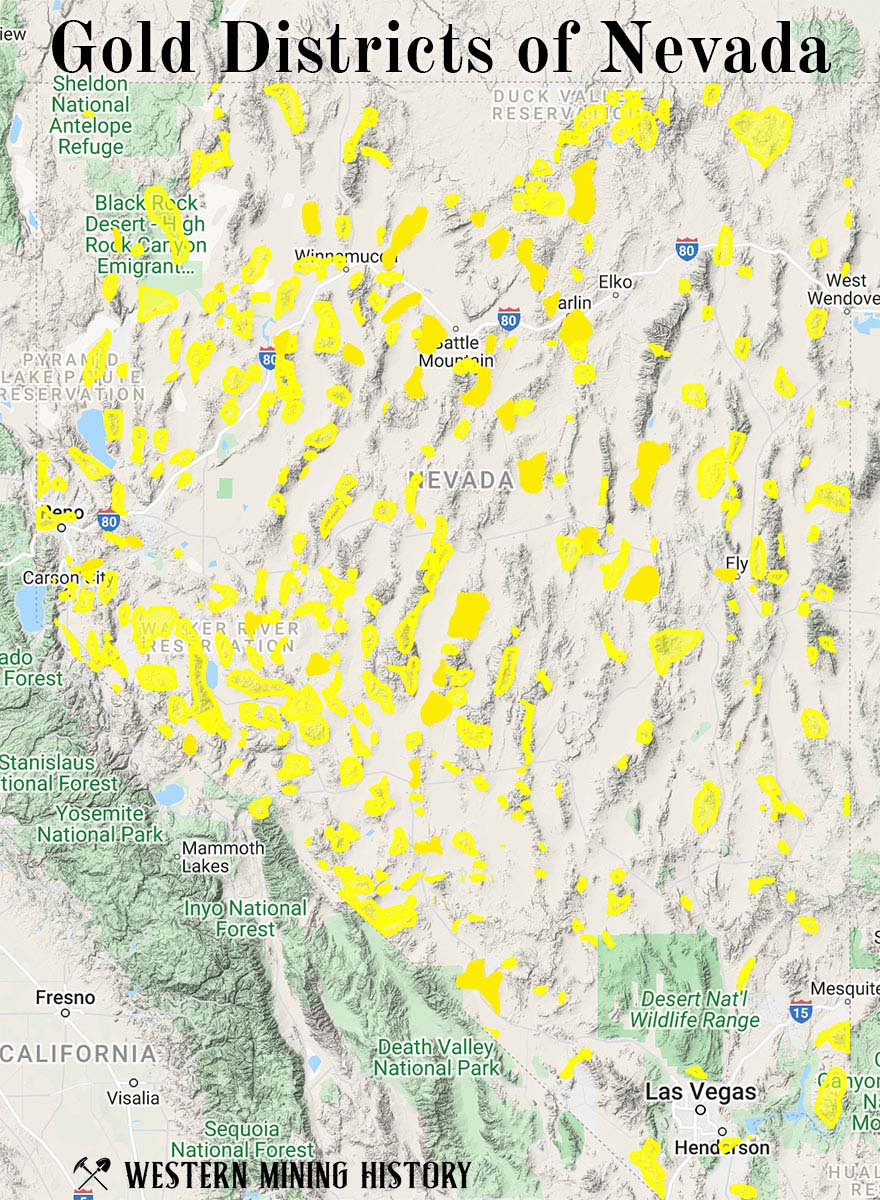The Julie Shaft is a lead, zinc, and silver mine located in Lander county, Nevada at an elevation of 5,850 feet.
About the MRDS Data:
All mine locations were obtained from the USGS Mineral Resources Data System. The locations and other information in this database have not been verified for accuracy. It should be assumed that all mines are on private property.
Mine Info
Elevation: 5,850 Feet (1,783 Meters)
Commodity: Lead, Zinc, Silver
Lat, Long: 40.53111, -117.13861
Map: View on Google Maps
Julie Shaft MRDS details
Site Name
Primary: Julie Shaft
Secondary: Copper Canyon Mine Lead-Zinc Orebody:Hornfels Orebody
Commodity
Primary: Lead
Primary: Zinc
Primary: Silver
Secondary: Gold
Secondary: Copper
Tertiary: Iron
Tertiary: Sulfur
Location
State: Nevada
County: Lander
District: Battle Mountain District
Land Status
Land ownership: Private
Note: the land ownership field only identifies whether the area the mine is in is generally on public lands like Forest Service or BLM land, or if it is in an area that is generally private property. It does not definitively identify property status, nor does it indicate claim status or whether an area is open to prospecting. Always respect private property.
Holdings
Not available
Workings
Not available
Ownership
Owner Name: Copper Canyon Mining Co.
Years: 1950 -
Production
Not available
Deposit
Record Type: Site
Operation Category: Past Producer
Operation Type: Unknown
Year First Production: 1948
Discovery Year: 1941
Discovery Method: Ore-Mineral In Place
Years of Production:
Organization:
Significant: N
Deposit Size: S
Physiography
General Physiographic Area: Intermontane Plateaus
Physiographic Province: Basin And Range Province
Physiographic Section: Great Basin
Physiographic Detail: Basin And Mountains
Mineral Deposit Model
Model Name: Skarn Zn-Pb
Orebody
Form: IRREGULAR
Structure
Type: R
Description: Thrust Fault At Depth
Type: L
Description: Virgin & Mill Faults, N-S, Dip 65 W; Other Faults. The West Fault, Trends Nw And Forms The Nw Boundary Of The Hornfels Orebody As This Fault Contains Primary Sulfides, It May Have Been The Channel For Mineralizing Fluids Which Formed The Hornfels Orebody
Alterations
Alteration Type: L
Alteration Text: Propylitic, Pyritic
Rocks
Name: Quartz Monzonite
Role: Associated
Age Type: Host Rock
Age Young: Pennsylvanian
Name: Quartz Monzonite
Role: Associated
Age Type: Associated Rock
Age Young: Pliocene
Name: Quartz Monzonite
Role: Associated
Age Type: Associated Rock Unit
Age Young: Pliocene
Name: Quartz Monzonite
Role: Associated
Age Type: Host Rock Unit
Age Young: Pennsylvanian
Analytical Data
Analytical Data: AVERAGE ORE GRADE 2.5% PB, 1.5% ZN, 3 OZ AG/TON
Materials
Ore: Pyrrhotite
Ore: Chalcopyrite
Ore: Sphalerite
Ore: Pyrite
Gangue: Quartz
Gangue: Calcite
Gangue: Siderite
Gangue: Barite
Comments
Comment (Deposit): VEINS, DISSEMINATIONS; INTERSECTION OF TWO FAULTS; ORE GRADE DECREASES AWAY FROM THE INTERSECTION
Comment (Production): PRODUCTION WAS FROM 1948 TO 1952, AND INCLUDED 3 OZ/TON AG WITH MINOR CU AND AU.
Comment (Development): THE LEAD-ZINC OREBODY ON COPPER CANYON MINE GROUND WAS FIRST DISCOVERED IN 1941 BY DIAMOND-DRILLING, AFTER WHICH THE JULIE SHAFT WAS SUNK TO THE 700-FT. LEVEL TO MINE IT. FIRES AND MARKET FLUCTUATIONS CAUSED PRODUCTION TO BE SPORADIC UNTIL 1957, WHEN THE MILL WAS SHUT DOWN, WITH LESSEE ACTIVITY CONTINUING UNTIL 1959 WHEN THE U.S. GOV'T. TOOK IT OVER.
Comment (Workings): SHAFT & CONNECTING WORKINGS
Comment (Geology): ORE GRADE DECREASED NORTHWARD AWAY FROM INTERSECTION OF GULCH AND WEST FAULTS
Comment (Location): 500 FT SE OF VIRGIN SHAFT OF COPPER CANYON MINE
Comment (Deposit): THE LEAD-ZINC OREBODY ON COPPER CANYON MINE GROUND WAS FIRST DISCOVERED BY DIAMOND-DRILLING IN 1941. IN 1947, COPPER CANYON MINING CO SANK THE EXISTING JULIE SHAFT TO THE 700-FOOT LEVEL TO MINE THE LEAD-ZINC OREBODY. PRODUCTION OF PB-ZN ORE BEGAN IN 1948. FIRES AND MARKET FLUCTUATIONS RESULTED IN INTERMITTENT PRODUCTION UNTIL 1957 WHEN THE MILL WAS SHUT DOWN; WITH LESSEE ACTIVITY CONTINUING UNTIL 1959 WHEN THE U.S. GOV'T TOOK IT OVER JULIE SHAFT WAS FIRST PUT DOWN IN 1941 TO MINE COPPER-GOLD ORE. ; INFO.SRC : 1 PUB LIT
References
Reference (Deposit): ROBERTS, R.J., AND ARNOLD, D.C., 1965 ORE DEPOSITS OF THE ANTLER PEAK QUADRANGLE, HUMBOLDT AND LANDER COUNTIES, NEVADA: U.S.G.S. PROF PAPER 459-B
Reference (Deposit): TRENGROVE, R.R., 1951, INVESTIGATION OF COPPER CANYON LEAD-ZINC DEPOSIT, LANDER CO NEVADA: U.S.B.M. REPT. INV. 4774
Reference (Production): ROBERTS, R.J., AND ARNOLD, D.C., 1965
Nevada Gold

Nevada has a total of 368 distinct gold districts. Of the of those, just 36 are major producers with production and/or reserves of over 1,000,000 ounces, 49 have production and/or reserves of over 100,000 ounces, with the rest having less than 100,000 ounces. Read more: Gold Districts of Nevada.